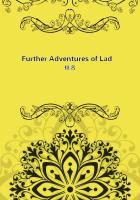Another law bears more than all the personal impress of William.In it he at once, on one side, forestalls the most humane theories of modern times, and on the other sins most directly against them.His remarkable unwillingness to put any man to death, except among the chances of the battle-field, was to some extent the feeling of his age.With him the feeling takes the shape of a formal law.He forbids the infliction of death for any crime whatever.But those who may on this score be disposed to claim the Conqueror as a sympathizer will be shocked at the next enactment.Those crimes which kings less merciful than William would have punished with death are to be punished with loss of eyes or other foul and cruel mutilations.Punishments of this kind now seem more revolting than death, though possibly, now as then, the sufferer himself might think otherwise.But in those days to substitute mutilation for death, in the case of crimes which were held to deserve death, was universally deemed an act of mercy.Grave men shrank from sending their fellow-creatures out of the world, perhaps without time for repentance; but physical sympathy with physical suffering had little place in their minds.In the next century a feeling against bodily mutilation gradually comes in; but as yet the mildest and most thoughtful men, Anselm himself, make no protest against it when it is believed to be really deserved.There is no sign of any general complaint on this score.The English Chronicler applauds the strict police of which mutilation formed a part, and in one case he deliberately holds it to be the fitting punishment of the offence.
In fact, when penal settlements were unknown and legal prisons were few and loathsome, there was something to be said for a punishment which disabled the criminal from repeating his offence.In William's jurisprudence mutilation became the ordinary sentence of the murderer, the robber, the ravisher, sometimes also of English revolters against William's power.We must in short balance his mercy against the mercy of Kirk and Jeffreys.
The ground on which the English Chronicler does raise his wail on behalf of his countrymen is the special jurisprudence of the forests and the extortions of money with which he charges the Conqueror.In both these points the royal hand became far heavier under the Norman rule.In both William's character grew darker as he grew older.He is charged with unlawful exactions of money, in his character alike of sovereign and of landlord.We read of his sharp practice in dealing with the profits of the royal demesnes.He would turn out the tenant to whom he had just let the land, if another offered a higher rent.But with regard to taxation, we must remember that William's exactions, however heavy at the time, were a step in the direction of regular government.In those days all taxation was disliked.Direct taking of the subject's money by the King was deemed an extraordinary resource to be justified only by some extraordinary emergency, to buy off the Danes or to hire soldiers against them.Men long after still dreamed that the King could "live of his own," that he could pay all expenses of his court and government out of the rents and services due to him as a landowner, without asking his people for anything in the character of sovereign.Demands of money on behalf of the King now became both heavier and more frequent.And another change which had long been gradually working now came to a head.When, centuries later, the King was bidden to "live of his own," men had forgotten that the land of the King had once been the land of the nation.In all Teutonic communities, great and small, just as in the city communities of Greece and Italy, the community itself was a chief landowner.The nation had its FOLKLAND, its AGER PUBLICUS, the property of no one man but of the whole state.Out of this, by the common consent, portions might be cut off and BOOKED--granted by a written document--to particular men as their own BOOKLAND.The King might have his private estate, to be dealt with at his own pleasure, but of the FOLKLAND, the land of the nation, he was only the chief administrator, bound to act by the advice of his Witan.But in this case more than in others, the advice of the Witan could not fail to become formal; the FOLKLAND, ever growing through confiscations, ever lessening through grants, gradually came to be looked on as the land of the King, to be dealt with as he thought good.We must not look for any change formally enacted; but in Edward's day the notion of FOLKLAND, as the possession of the nation and not of the King, could have been only a survival, and in William's day even the survival passed away.The land which was practically the land of King Edward became, as a matter of course, TERRA REGIS, the land of King William.That land was now enlarged by greater confiscations and lessened by greater grants than ever.For a moment, every lay estate had been part of the land of William.And far more than had been the land of the nation remained the land of the King, to be dealt with as he thought good.
In the tenure of land William seems to have made no formal change.














